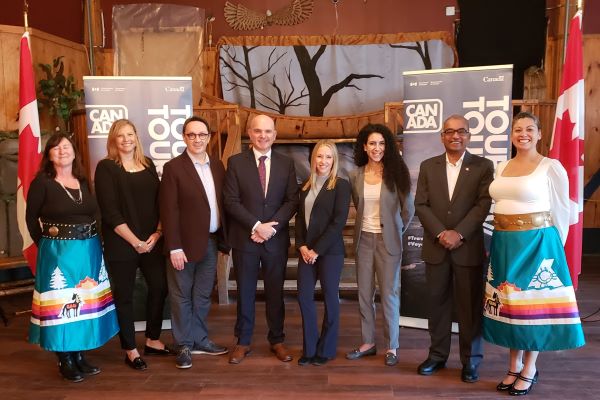Pan-Canadian Task Force Creating Framework and Tools to Alleviate Workforce Shortages and Skills Gaps
(OTTAWA, ON—October 3, 2022) Tourism HR Canada will lead a pan-Canadian task force and urgently needed initiatives to tackle the workforce challenges impacting the tourism sector, with thanks to generous funding announced today by the Government of Canada through its National Priorities Stream. Tourism has over 200,000 fewer workers compared to pre-pandemic; addressing systemic and structural issues is vital to the full recovery and sustainable growth of the hard-hit sector.
“Forget a labour shortage—tourism is facing a labour crisis,” stated Philip Mondor, Tourism HR Canada president and CEO. “Tourism’s workforce was devastated by the impacts of the pandemic and has yet to recover. Many employers are having difficulty attracting talent in a very competitive job market. The increasing demand for Canada’s unique tourism experiences is grossly outpacing the number of workers available to provide the world-class service we aspire to. We require cohesive, collaborative action to secure and support a skilled, diverse, and inclusive workforce. We are grateful for the strong support of the federal government through the National Priorities Stream; this funding allows us to develop a targeted strategy and a suite of resources aimed at labour and training needs.”
“Today’s announcement demonstrates our government’s continued commitment to strengthening the foundation for growth in our tourism sector,” said the Honourable Randy Boissonnault, Minister of Tourism and Associate Minister of Finance. “The visitor economy and the many partners that deliver unforgettable experiences to Canadians and international visitors boost Canada’s economic health. These Canada-wide investments will support our upcoming renewed Federal Tourism Growth Strategy, placing Canada on the global stage as a premier tourism destination.”
Tourism HR Canada and the Tourism Workforce Recovery and Growth Task Force will identify specific workforce-related issues impacting the Canadian tourism sector’s ability to meet increasing demand and provide direction and tools to address them. These resources will ensure a sustained supply of skilled tourism workers across the country, as well as equip tourism businesses with the expertise to develop progressive HR policies and business practices.
Among the initiatives are:
- a comprehensive attraction and retention strategy;
- recovery programs and services for reskilling and upskilling;
- a digitalization strategy to enhance business resilience;
- tools to help employers manage new HR demands; and
- continued workforce/labour market research to inform strategies.
The work will align with key existing and incoming national, regional, and local labour market plans and strategies, including the Federal Tourism Growth Strategy and the United Nations Sustainable Development Goals. Specific attention will be given to Indigenous tourism workforce development.
“Together with our partners and stakeholders across the country, we will set a foundation for the Canadian tourism sector to re-establish its place as a key economic driver,” adds Mondor.
Details on the work of the task force can be found at TourismHR.ca/Taskforce.
-30-
About Tourism HR Canada:
Tourism HR Canada is a pan-Canadian organization with a mandate aimed at building a world-leading tourism workforce. It facilitates, coordinates, and enables human resource development activities that support a globally competitive and sustainable industry and foster the development of a dynamic and resilient workforce. The organization works with the industry to attract, train, and retain valuable tourism professionals by giving them the tools and resources they need to succeed in their careers and entrepreneurial endeavours.
About the National Priorities Stream:
Innovation, Science and Economic Development Canada supports the advancement of national tourism priorities aligned with Canada’s Federal Tourism Growth Strategy. These include destination development, seasonal and geographic dispersion, and human resources and skills development. This funding will provide the opportunity to leverage the reach and expertise of national tourism organizations to support pan-Canadian or multi-regional activities—like conferences and events, training and research, and network building—focused on addressing challenges facing the tourism sector on its path to recovery.
Media Enquiries:
Jon Kiely
Vice-President, Workforce Development
Tourism HR Canada
jkiely@tourismhr.ca

